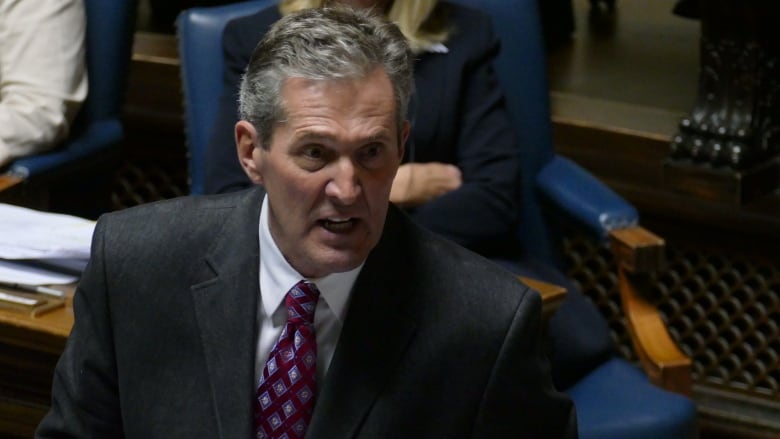Major surgery or just a few stitches? Manitobans wait to see how Pallister wields his knife
There will be public service cuts in 2017-18 budget, but what's unclear is how deep they'll go

What do you want to see in the budget? How do you think you'll be impacted? Tell us what you think in a video comment in our new Good Talk experiment.
If you're trying to predict how deep Manitoba's Progressive Conservative government will cut the provincial public service in next week's budget, it's tempting to look next door to Saskatchewan for clues.
Like Manitoba, our neighbour to the west has a deficit in the billion-dollar range and a small-C conservative premier in the Saskatchewan Party's Brad Wall. His solution: cut public-service wages across the board by 3.5 per cent in an effort to save about $250 million.
Unlike Manitoba, Saskatchewan wrestles with a boom-and-bust economy whose fortunes wax and wane with those of the oil and potash industries. Saskatchewan may be drowning in red ink right now — its projected deficit for the 2016-17 is $1.29 billion — but it should wind up in the black again, regardless of any direction taken by its government.

Pallister has only been Manitoba's premier for almost a year. As inspiration, he's less likely to follow the lead of three-term premier Wall than he is to take direction from a first-term Liberal premier — Quebec's Philippe Couillard, albeit three budget seasons ago.
When Couillard's Liberals took power in 2014, Quebec had just posted a $2.2-billion deficit and was straining under the weight of enormous interest payments on Canada's largest pile of debt. There was a sense even a Liberal government would continue the province's decades-long tendency to ignore that debt.
Instead, Quebec cracked down on spending by making enormous cuts to both health and education. Couillard's Liberals also enacted a public-service hiring freeze, earning criticism for what was deemed at the time as a harsh austerity package.

The expectation in Quebec is Couillard will cruise to re-election in 2018 on the backs of the remarkable fiscal turnaround. While critics grumble about the gutting of core services, spending is back on the rise now that bleeding has been stopped at budget time.
Depending on the economic indicator, Manitoba is both better and worse off than Quebec. The debt-to-GDP ratio in this province is less severe, but Manitoba's overall economy has less potential to grow, at least the way Quebec's did during the last few years.
Nonetheless, Pallister can not ignore the Quebec example when he determines his course of action for the next few years. While the initial Tory budget in 2016 amounted to a stay-the-course, do-nothing spending plan, Pallister has made it clear the budget coming on Tuesday will be far more painful, even though it's likely to be nicknamed something along the lines of "responsible restructuring."
Deep cuts in 2017-18 would enable the Pallister government to appear less austere in the lead-up to the next election and if all goes well, even make that promised PST cut prior to 2020.
- Manitoba Hydro to shrink workforce by roughly 900 positions
- Union leaders say Pallister pushing ahead with civil service cuts
- Layoffs not off the table for public sector employees: Premier
"We have made it very clear we're trying to keep people at work on the front line," Pallister told reporters Tuesday at a scrum at the Manitoba Legislature.
"We have started to trim. We have begun our trimming exercise at the top of our organizations, right in my office, and in every way we're trying to protect front-line services and we're trying to protect the people who deliver those services."
Other cuts are also possible, however. Going into next week's budget, the lack of definition of what constitutes front-line services has confounded labour unions.
"Folks are really questioning, 'What's going to happen to my job? Am I going to be here? Are the services that I provide going to be here? Am I still going to be providing them? How is this moving forward?'" said Michelle Gawronsky, president of the MGEU.

In March, the Tories tabled legislation to enforce a two-year wage freeze on 120,000 public-sector workers, including doctors, followed by 0.75 per cent in the third year, and one per cent in the fourth.
- Legislative battle between Pallister, unions begins Monday
- Wage freezes coming for Manitoba's public servants, doctors, nurses
This move doesn't borrow from Quebec, but from legislation passed in 2015 (but never proclaimed) in Nova Scotia, where the Liberal government enforced wage controls on both unionized and non-unionized government employees.
In Manitoba, labour unions have vowed to fight the wage-freeze legislation in court. The NDP opposition, meanwhile, is already characterizing the coming budget as ignoring the health-care and educational needs of Manitobans.
"What we're fearful of is that Pallister is going to pursue this ideology of austerity," Fort Rouge MLA Wab Kinew said on Tuesday, complaining about the premier's "cavalier attitude" toward the well-being of Manitobans by insisting upon what he described as arbitrary cuts.
The real target for the premier is not a specific number of employees. The real figures driving Pallister's actions are a projected deficit of $872 million for this fiscal year, provincial net debt of $23.1 billion and a debt-to-GDP ratio of 34.4 per cent.
CBC News is partnering with GoodTalk, a new engagement tool that lets Canadians watch and record video comments on top stories and even get featured on the CBC. Follow the links to try it out.
With files from Sean Kavanagh and Kristin Annable